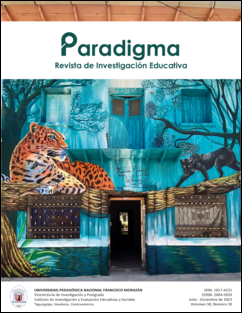The Challenge of Developing Scientific: The Experience of the Regional Center for Teacher Training an Educational Research, CRESUR, México
DOI:
https://doi.org/10.5377/paradigma.v30i50.17097Keywords:
educational policy, education planning, periodical scientific publication, science popularization, university cooperationAbstract
Generating and disseminating knowledge through periodical publications that achieve the recognition of academic communities is one of the main objectives of Higher Education Institutions. This paper narrates the experience of a small teacher training and educational research center that managed to place three journals in a short time in various indexes and catalogs of scientific publications, despite facing adverse budgetary and political-administrative contexts. It presents a story of effort, resilience and limitations, which is not alien to many academic institutions and scientific communities in Latin America, so it is pertinent to know it, identify its critical conditions of success, as well as some limitations that ultimately proved insurmountable; such as budgetary constraints and their effect on the Centre's financial precariousness which precipitated its closure in just the ninth year of operation, despite having achieved an outstanding projection in its field, among other reasons, thanks to the magazines and the communities that were articulated around them. The methodology is based on a case study, is participatory-ethnographic in nature, and is based on research techniques and documentary analysis.
Downloads
317
Downloads
Published
How to Cite
Issue
Section
License
Copyright (c) 2023 Universidad Pedagógica Nacional Francisco Morazán

This work is licensed under a Creative Commons Attribution-NonCommercial-NoDerivatives 4.0 International License.
Transfer of Copyright
- The author, when sending the work, states that it is his will to give the Universidad Pedagógica Nacional Francisco Morazán the patrimonial rights that correspond to him as the author of his work.
- The rights here assigned include all economic rights (Reproduction, transformation, public communication and distribution) and are given without limitation in terms of territory; This Assignment is given for the entire duration term established in the current legislation in Honduras.
- The cession of the aforementioned rights does not imply the cession of moral rights over it, because in accordance with the provisions of the Copyright and Related Rights Law, Chapter II, of the Moral Rights, Article 34, Article 25 , these rights are inalienable, imprescriptible, indefeasible and inalienable.
- The research work or document must be original and have been done without violating or usurping rights of third parties, therefore, the work is exclusively authored and owns the same.
- In the case of any claim or action by a third party, as to copyright on the work in question, the author must assume full responsibility for the rights assigned.
- Upon completion of the Rights Assignment Form, the author states that the work has not been published in another way, that the rights on the work have not been assigned and that no encumbrance or limitation on their use or use is imposed on them.





